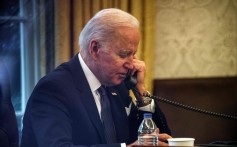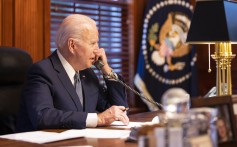
My Take by Alex Lo
US is biting off more than it can chew over Taiwan and Ukraine
US President Joe Biden has reassured Ukraine that the United States and its allies “will respond decisively if Russia further invades Ukraine”. His secretary of state, Antony Blinken, has recently made a similar reassurance to Taiwan.
One must wonder how seriously presidents Volodymyr Zelensky and Tsai Ing-wen take Washington’s word for it. The problem is not only that America’s security guarantees aren’t what they used to be, but that both are clearly asking what Washington is unwilling to give.
The big question is often understood to be Washington’s willingness – or not – to go to war for Ukraine and Taiwan, even at the risk of spilling American blood and risking a regional conflagration in eastern Europe and East Asia. But this may be too simplistic.
The real problem is that Ukraine wants full and unconditional recognition to be treated as a full sovereign state, with secure borders; and Taiwan wants something similar, even if it is ready to concede to using diplomatic words or terms that may fall short of the literal meaning of full sovereignty.

Despite lip service, it seems clear Washington is not ready to give Ukraine such recognition and acknowledgement of that status. And it has, on record and repeatedly, reaffirmed its commitment to the one-China policy, however this vague doctrine is interpreted differently by various state-level actors.
The US may be happy to use Ukraine and Taiwan as a diplomatic or even a military wedge against Moscow and Beijing, and both Kyiv and Taipei are willing to be so used in exchange for sovereign gains. But Ukraine and Taiwan are taking an existential risk, and they unlikely want to put Washington’s professed commitments to the test.
Ukraine and Russia
After all, there is an inherent contradiction in US policy towards both places. In the case of Ukraine, Washington has asked Moscow and Kyiv to return to the principles, so far unimplemented, of the Minsk agreements of 2014 and 2015, and negotiate on their basis.
Both those protocols precisely amplify the conflicts between Russia and Ukraine; or from Moscow’s perspective according to which it is not even a party to the conflict, which is between Ukraine and pro-Russian secessionist forces in eastern Ukraine and the Donbas region.
Quite simply, the Russians consider the Minsk protocols as formally establishing limited territorial sovereignty whereas, obviously, Ukraine considers the goal of implementing those protocols as establishing its full sovereignty with secure borders. Currently, despite Washington’s strong words of support for Ukraine and warnings against Moscow, it is not ready to commit to Kyiv’s position; hence its urging of both sides to return to Minsk I and II.
One must wonder how seriously presidents Volodymyr Zelensky and Tsai Ing-wen take Washington’s word for it. The problem is not only that America’s security guarantees aren’t what they used to be, but that both are clearly asking what Washington is unwilling to give.
The big question is often understood to be Washington’s willingness – or not – to go to war for Ukraine and Taiwan, even at the risk of spilling American blood and risking a regional conflagration in eastern Europe and East Asia. But this may be too simplistic.
The real problem is that Ukraine wants full and unconditional recognition to be treated as a full sovereign state, with secure borders; and Taiwan wants something similar, even if it is ready to concede to using diplomatic words or terms that may fall short of the literal meaning of full sovereignty.

Despite lip service, it seems clear Washington is not ready to give Ukraine such recognition and acknowledgement of that status. And it has, on record and repeatedly, reaffirmed its commitment to the one-China policy, however this vague doctrine is interpreted differently by various state-level actors.
The US may be happy to use Ukraine and Taiwan as a diplomatic or even a military wedge against Moscow and Beijing, and both Kyiv and Taipei are willing to be so used in exchange for sovereign gains. But Ukraine and Taiwan are taking an existential risk, and they unlikely want to put Washington’s professed commitments to the test.
Ukraine and Russia
After all, there is an inherent contradiction in US policy towards both places. In the case of Ukraine, Washington has asked Moscow and Kyiv to return to the principles, so far unimplemented, of the Minsk agreements of 2014 and 2015, and negotiate on their basis.
Both those protocols precisely amplify the conflicts between Russia and Ukraine; or from Moscow’s perspective according to which it is not even a party to the conflict, which is between Ukraine and pro-Russian secessionist forces in eastern Ukraine and the Donbas region.
Quite simply, the Russians consider the Minsk protocols as formally establishing limited territorial sovereignty whereas, obviously, Ukraine considers the goal of implementing those protocols as establishing its full sovereignty with secure borders. Currently, despite Washington’s strong words of support for Ukraine and warnings against Moscow, it is not ready to commit to Kyiv’s position; hence its urging of both sides to return to Minsk I and II.
A recent study by the Chatham House think tank explains the details of this conundrum further:
“Ukraine sees the [Minsk] agreements as instruments with which to re-establish its sovereignty in line with the following sequence: a ceasefire; a Russian withdrawal from eastern Ukraine; return of the Russia/Ukraine border to Ukrainian control; free and fair elections in the Donbas region; and a limited devolution of power to Russia’s proxy regimes, which would be reintegrated and resubordinated to the authorities in Kyiv. Ukraine would be able to make its own domestic and foreign policy choices.”
However, Moscow reverses the sequence and reaches the opposite conclusion. The study continues:
“Russia sees the Minsk agreements as tools with which to break Ukraine’s sovereignty. Its interpretation reverses key elements in the sequence of actions: elections in occupied Donbas would take place before Ukraine had reclaimed control of the border; this would be followed by comprehensive autonomy for Russia’s proxy regimes, crippling the central authorities in Kyiv. Ukraine would be unable to govern itself effectively or orient itself towards the West.”
Minsk I and II won’t help resolve the Ukraine crisis; rather they crystallise the very nature of the conflict.
Taiwan and Beijing
In the case of Taiwan, you have something extremely similar, and even more clear-cut. Washington does not even recognise Taiwan’s sovereignty, however much it’s willing to play the Taiwan card as part of its multipronged, anti-China campaign, by encouraging it to assert itself on various international arenas.
Here’s the problem for Tsai. Unless the US is willing to abandon the one-China policy and recognise Taiwan’s sovereignty, its security guarantee will always remain ambiguous. Taiwan will only know the true worth of America’s guarantee if it takes that fateful and terrifying step, which actually, the vast majority of Taiwanese don’t want to contemplate, let alone take.

I am not denying that many Taiwanese want independence, but most want peace; or to avoid war much more, as polls have shown.
The US and some of its allies, and Taiwan and Ukraine, have been pushing each other into confronting Russia and China, and finding it increasingly difficult to back down. But in time, Washington is likely to realise only “limited sovereignty” for Ukraine and limited government for Taiwan can avoid war. It may well, in other words, end up moving closer to rival China and Russia at the expense of both friendly Kyiv and Taipei. And that will actually be for everyone’s good.
“Ukraine sees the [Minsk] agreements as instruments with which to re-establish its sovereignty in line with the following sequence: a ceasefire; a Russian withdrawal from eastern Ukraine; return of the Russia/Ukraine border to Ukrainian control; free and fair elections in the Donbas region; and a limited devolution of power to Russia’s proxy regimes, which would be reintegrated and resubordinated to the authorities in Kyiv. Ukraine would be able to make its own domestic and foreign policy choices.”
However, Moscow reverses the sequence and reaches the opposite conclusion. The study continues:
“Russia sees the Minsk agreements as tools with which to break Ukraine’s sovereignty. Its interpretation reverses key elements in the sequence of actions: elections in occupied Donbas would take place before Ukraine had reclaimed control of the border; this would be followed by comprehensive autonomy for Russia’s proxy regimes, crippling the central authorities in Kyiv. Ukraine would be unable to govern itself effectively or orient itself towards the West.”
Minsk I and II won’t help resolve the Ukraine crisis; rather they crystallise the very nature of the conflict.
Taiwan and Beijing
In the case of Taiwan, you have something extremely similar, and even more clear-cut. Washington does not even recognise Taiwan’s sovereignty, however much it’s willing to play the Taiwan card as part of its multipronged, anti-China campaign, by encouraging it to assert itself on various international arenas.
Here’s the problem for Tsai. Unless the US is willing to abandon the one-China policy and recognise Taiwan’s sovereignty, its security guarantee will always remain ambiguous. Taiwan will only know the true worth of America’s guarantee if it takes that fateful and terrifying step, which actually, the vast majority of Taiwanese don’t want to contemplate, let alone take.

I am not denying that many Taiwanese want independence, but most want peace; or to avoid war much more, as polls have shown.
The US and some of its allies, and Taiwan and Ukraine, have been pushing each other into confronting Russia and China, and finding it increasingly difficult to back down. But in time, Washington is likely to realise only “limited sovereignty” for Ukraine and limited government for Taiwan can avoid war. It may well, in other words, end up moving closer to rival China and Russia at the expense of both friendly Kyiv and Taipei. And that will actually be for everyone’s good.
At the end of the day, the reality is that the US is no longer the dominant military force it ever was.
ReplyDeleteJust as it did not do anything beside levelling some sanctions when Russia grabbed Crimea, the US can only talk of sanctions. It can't afford a war with Russia and it can't win too.
Similarly, in Taiwan, the US can't or won't do much more beyond issuing demands and impose sanctions on China.
China today is not the sick man of Asia in the 19th century.
We must realise the US has not won a war since WW2. And I doubt if they can win either war against Russia and China
Ukraine is a sovereign nation that has the right to determine its own policies.
ReplyDeleteWhether it aligns with NATO or Russia or remains neutral is for the people of Ukraine to determine, not Moscow.
Its funny how Lefties who talk-cock about non-Interference in the internal affairs of other countries become silent and close both eyes when the Interfering in Other country's Internal Affairs is being carried out by Moscow or Beijing.
Majority in Taiwan just want to be left in peace to run their own affairs and live their lives.
Taiwan is a liberal democracy with a market economy and proper rule of law. A rarity in Asia.
The People's Republic of China under Winnie the Pooh is every day threatening to turn Taiwan into a burning wreck if it refuses to become part of Beijing rule.
Fuck you , PRC !
Ukraine - Russian "Monroe doctrine" applies
DeleteTaiwan - Then USA should recognise Taiwan as a sovereign nation
This old moneyed mfer is at its know-nothing play AGAIN!
DeleteTaiwan is a renegade province of China, PERIOD.
Who the f*ck r u to interfere in the internal politics of China?
As dictated by yr uncle Sam, YES?